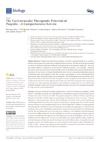Please use this identifier to cite or link to this item:
https://accedacris.ulpgc.es/handle/10553/77343
| Title: | The cardiovascular therapeutic potential of propolis—a comprehensive review | Authors: | Silva, Henrique Francisco, Rafaela De Figueiredo Saraiva, Ariana Maria Francisco, Simone Carrascosa Iruzubieta, Conrado Javier Raposo, António |
UNESCO Clasification: | 320501 Cardiología 3206 Ciencias de la nutrición 320607 Elementos minerales en la alimentación |
Keywords: | Antiangiogenic Antihypertensive Antioxidant Cardiovascular Protection Propolis |
Issue Date: | 2021 | Journal: | Biology | Abstract: | Owing to its chemical richness, propolis has a myriad of therapeutic properties. To the authors’ knowledge, this is the first comprehensive review paper on propolis to focus exclusively on its major effects for cardiovascular health. The propolis compound varieties with the most promising therapeutic benefits and their respective physiological mechanisms will be discussed. Propolis displays an anti-atherosclerotic activity, attained through modulation of the plasma lipid profile and through stabilization of the fatty plaque by inhibiting macrophage apoptosis, vascular smooth muscle proliferation and metalloproteinase activity. The antihypertensive effects of propolis probably arise through the combination of several mechanisms, including the suppression of catecholamine synthesis, stimulation of endothelium-dependent vasorelaxation and vascular anti-inflammatory activity. The anti-hemostatic activity of propolis is attributed to the inhibition of platelet plug formation and antifibrinolytic activity. By inhibiting the secretion of proangiogenic factors, propolis suppresses endothelial cell migration and tubulogenesis, exerting antiangiogenic activity. The an-tioxidant and anti-inflammatory activities are responsible for protection against vascular endothelial and cardiomyocyte dysfunction, mostly by the prevention of oxidative stress. Among the reviewed propolis varieties, the Brazilian green and red varieties show the largest number of beneficial ac-tivities. Further research, especially preclinical, should be conducted to assess the cardiovascular benefits of the given varieties with different compositions. | URI: | https://accedacris.ulpgc.es/handle/10553/77343 | ISSN: | 2079-7737 | DOI: | 10.3390/biology10010027 | Source: | Biology [EISSN 2079-7737], v. 10 (1), 27, (Enero 2021) |
| Appears in Collections: | Artículos |
SCOPUSTM
Citations
32
checked on Mar 30, 2025
WEB OF SCIENCETM
Citations
27
checked on Mar 30, 2025
Page view(s)
221
checked on Nov 1, 2024
Download(s)
85
checked on Nov 1, 2024
Google ScholarTM
Check
Altmetric
Share
Export metadata
Items in accedaCRIS are protected by copyright, with all rights reserved, unless otherwise indicated.
